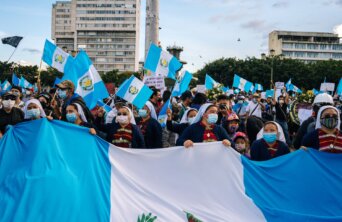- About
- Topics
- Story
- In-Depth
- Picks
- Opinion
- News
- Donate
- Signup for our newsletterOur Editors' Best Picks.Send
Read, Debate: Engage.
| topic: | Election |
|---|---|
| located: | Guatemala |
| editor: | Ellen Nemitz |
The presidential election in Guatemala, which will determine the new leader of the country after four years under the presidency of Alejandro Giammettei, has been breathtaking.
Before the first round on 25 June, no one would have believed that the leftist Movimiento Semilla (Seed Movement) would have a chance at securing a place in the run-offs, scheduled for 20 August. The candidates predicted to most likely contest - among the nearly 20 who postulated - were Zury Mayté Ríos Sosa, who defended a far-right agenda, Sandra Torres and Edmond Mulet, as pointed out by El País.
By the end of ballot count, Torres, who sustains the rightist speech of "respect for life, family, religious freedom and free enterprise," guaranteed her place, earning nearly 15 percent of votes. But her opponent will be Bernardo Arévalo, from Movimiento Semilla, who received around 12 percent. This great surprise, which also extends for regional legislative and executive positions, was largely celebrated in the days coming as a "sign of shifting political tides."
For the correspondent in Guatemala Jeff Abbot, the election of Arévalo, who advocates against corruption and for new health and education policies, could be "the difference between reform and the continuation of the degradation of the state of rights."
However, just one week later, the story hit a turning point when the Constitutional Court accepted an allegation of fraud and decided for a vote recount. The script brings a deja-vu feeling since this is not the first time America resorted to a fraud accusation to put election results in doubt: it has happened before in Paraguay, Honduras, Venezuela and Brazil, to mention a few cases.
This is a method to divert the focus of political actors away from the candidates and to the population and the media. If recklessly used, the stratagem weakens democracy and jeopardises the election process as a whole.
The acting Deputy Director at Human Rights Watch, Juan Pappier, also made this comparison and added that Guatemalan courts "have very little independence and credibility." The Electoral Observation Mission of the Organisation of American States (OAS) also showed concern for the situation. "Feeding a narrative of fraud without supporting evidence undermines the will of the people and democratic institutionality," reads the official note. "Elections should be won at the ballot box, not by disqualifying candidates or challenging legitimate results emanating from the electorate. In the democratic game, it is up to the winners to act with humility and the losers with dignity."
The Director of the Americas Division of Human Rights Watch, Juanita Goebertus, called institutions to respect ballots results, since the OAS mission made it clear that there is no reason to talk about fraud.
"The right to vote is sacred," she claimed. Moreover, the journalist at InSight Crime in Guatemala, Alex Papadovassilakis, assesses that money and the fear of imprisonment are the reasons behind the attempt of the country’s political establishment to "bulldoze democracy to avoid losing the presidency." In a Twitter thread, the author of the investigation "Perpetuating Corruption: The System Undermining the 2023 Guatemala Elections" explains that the recount is “about perpetuating a system designed to facilitate corruption and impunity, even if that means crushing what remains of democracy in Guatemala."
Image by Shalom de León

